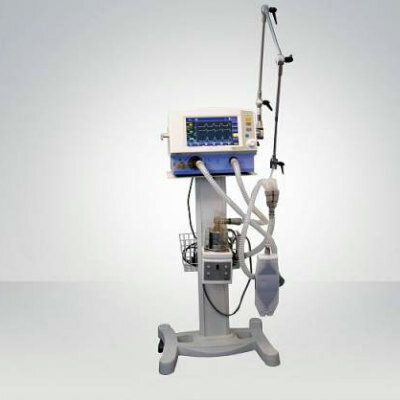Cooling Cap Helps Chemotherapy Patients Preserve Their Hair
|
By HospiMedica International staff writers Posted on 20 Dec 2021 |

Image: Amma can protect from chemotherapy induced hair loss (Photo courtesy of Cooler Heads)
A novel portable scalp cooling system (PSCS) is designed to help those undergoing chemotherapy avoid treatment-induced hair loss (alopecia).
The Cooler Heads (San Francisco, CA, USA) Amma device is a wearable cap designed to provide cooling therapy by circulating a water/isopropyl alcohol (IPA) mixture at a pre-set temperature and flow rate while placed firmly and securely on the patient’s head. The self-contained, electrically-powered refrigeration unit is programmed via a touchscreen controller with a menu-driven, graphical user interface. The controller is integrated into the refrigeration unit to allow healthcare professional to directly initiate, monitor, and complete the scalp cooling process.
Amma is first shipped independently to the patient, who is trained on how to use the system, and directed to bring it to the chemotherapy session. When the infusion therapy is concluded, two more hours of scalp cooling are delivered, during which patients unplug the device from the power outlet and continue treatment while in the car and in the comfort of their home. Once cooling is complete, the patient simply stores the device away and brings it with them for their next infusion. When they are done with chemotherapy, the Amma device is shipped back to Cooler Heads.
“Cancer patients undergoing chemo are dealing with the hardest challenge one can face; keeping their hair is critical to their mental health, their sense of self, and their recovery process,” said Kate Dilligan, CEO of Cooler Heads. “Scalp cooling is an effective way for cancer patients to save their hair, but existing methods are prohibitively expensive and difficult to use.”
Alopecia is a transient and mostly reversible consequence of systemic cytotoxic chemotherapy, as it attacks rapidly dividing cells in the body, including the dividing hair matrix cells. Alopecia can be psychologically and socially devastating; for some, the emotional trauma may be so severe as to lead to refusing or delaying further treatment. Recovery generally requires a period of several months to a year, amplifying the impact of the disease and its treatment.
Related Links:
Cooler Heads
The Cooler Heads (San Francisco, CA, USA) Amma device is a wearable cap designed to provide cooling therapy by circulating a water/isopropyl alcohol (IPA) mixture at a pre-set temperature and flow rate while placed firmly and securely on the patient’s head. The self-contained, electrically-powered refrigeration unit is programmed via a touchscreen controller with a menu-driven, graphical user interface. The controller is integrated into the refrigeration unit to allow healthcare professional to directly initiate, monitor, and complete the scalp cooling process.
Amma is first shipped independently to the patient, who is trained on how to use the system, and directed to bring it to the chemotherapy session. When the infusion therapy is concluded, two more hours of scalp cooling are delivered, during which patients unplug the device from the power outlet and continue treatment while in the car and in the comfort of their home. Once cooling is complete, the patient simply stores the device away and brings it with them for their next infusion. When they are done with chemotherapy, the Amma device is shipped back to Cooler Heads.
“Cancer patients undergoing chemo are dealing with the hardest challenge one can face; keeping their hair is critical to their mental health, their sense of self, and their recovery process,” said Kate Dilligan, CEO of Cooler Heads. “Scalp cooling is an effective way for cancer patients to save their hair, but existing methods are prohibitively expensive and difficult to use.”
Alopecia is a transient and mostly reversible consequence of systemic cytotoxic chemotherapy, as it attacks rapidly dividing cells in the body, including the dividing hair matrix cells. Alopecia can be psychologically and socially devastating; for some, the emotional trauma may be so severe as to lead to refusing or delaying further treatment. Recovery generally requires a period of several months to a year, amplifying the impact of the disease and its treatment.
Related Links:
Cooler Heads
Latest Patient Care News
- First-Of-Its-Kind Portable Germicidal Light Technology Disinfects High-Touch Clinical Surfaces in Seconds
- Surgical Capacity Optimization Solution Helps Hospitals Boost OR Utilization

- Game-Changing Innovation in Surgical Instrument Sterilization Significantly Improves OR Throughput
- Next Gen ICU Bed to Help Address Complex Critical Care Needs
- Groundbreaking AI-Powered UV-C Disinfection Technology Redefines Infection Control Landscape
- Clean Hospitals Can Reduce Antibiotic Resistance, Save Lives
- Smart Hospital Beds Improve Accuracy of Medical Diagnosis
- New Fast Endoscope Drying System Improves Productivity and Traceability
- World’s First Automated Endoscope Cleaner Fights Antimicrobial Resistance
- Portable High-Capacity Digital Stretcher Scales Provide Precision Weighing for Patients in ER
- Portable Clinical Scale with Remote Indicator Allows for Flexible Patient Weighing Use
- Innovative and Highly Customizable Medical Carts Offer Unlimited Configuration Possibilities
- Biomolecular Wound Healing Film Adheres to Sensitive Tissue and Releases Active Ingredients
- Wearable Health Tech Could Measure Gases Released From Skin to Monitor Metabolic Diseases
- Wearable Cardioverter Defibrillator System Protects Patients at Risk of Sudden Cardiac Arrest
- World's First AI-Ready Infrasound Stethoscope Listens to Bodily Sounds Not Audible to Human Ear
Channels
Artificial Intelligence
view channel
AI-Powered Algorithm to Revolutionize Detection of Atrial Fibrillation
Atrial fibrillation (AFib), a condition characterized by an irregular and often rapid heart rate, is linked to increased risks of stroke and heart failure. This is because the irregular heartbeat in AFib... Read more
AI Diagnostic Tool Accurately Detects Valvular Disorders Often Missed by Doctors
Doctors generally use stethoscopes to listen for the characteristic lub-dub sounds made by heart valves opening and closing. They also listen for less prominent sounds that indicate problems with these valves.... Read moreCritical Care
view channel
On-Skin Wearable Bioelectronic Device Paves Way for Intelligent Implants
A team of researchers at the University of Missouri (Columbia, MO, USA) has achieved a milestone in developing a state-of-the-art on-skin wearable bioelectronic device. This development comes from a lab... Read more
First-Of-Its-Kind Dissolvable Stent to Improve Outcomes for Patients with Severe PAD
Peripheral artery disease (PAD) affects millions and presents serious health risks, particularly its severe form, chronic limb-threatening ischemia (CLTI). CLTI develops when arteries are blocked by plaque,... Read more
AI Brain-Age Estimation Technology Uses EEG Scans to Screen for Degenerative Diseases
As individuals age, so do their brains. Premature aging of the brain can lead to age-related conditions such as mild cognitive impairment, dementia, or Parkinson's disease. The ability to determine "brain... Read moreSurgical Techniques
view channel
Novel Rigid Endoscope System Enables Deep Tissue Imaging During Surgery
Hyperspectral imaging (HSI) is an advanced technique that captures and processes information across a given electromagnetic spectrum. Near-infrared hyperspectral imaging (NIR-HSI) has particularly gained... Read more
Robotic Nerve ‘Cuffs’ Could Treat Various Neurological Conditions
Electric nerve implants serve dual functions: they can either stimulate or block signals in specific nerves. For example, they may alleviate pain by inhibiting pain signals or restore movement in paralyzed... Read more
Flexible Microdisplay Visualizes Brain Activity in Real-Time To Guide Neurosurgeons
During brain surgery, neurosurgeons need to identify and preserve regions responsible for critical functions while removing harmful tissue. Traditionally, neurosurgeons rely on a team of electrophysiologists,... Read more.jpg)
Next-Gen Computer Assisted Vacuum Thrombectomy Technology Rapidly Removes Blood Clots
Pulmonary embolism (PE) occurs when a blood clot blocks one of the arteries in the lungs. Often, these clots originate from the leg or another part of the body, a condition known as deep vein thrombosis,... Read moreHealth IT
view channel
Machine Learning Model Improves Mortality Risk Prediction for Cardiac Surgery Patients
Machine learning algorithms have been deployed to create predictive models in various medical fields, with some demonstrating improved outcomes compared to their standard-of-care counterparts.... Read more
Strategic Collaboration to Develop and Integrate Generative AI into Healthcare
Top industry experts have underscored the immediate requirement for healthcare systems and hospitals to respond to severe cost and margin pressures. Close to half of U.S. hospitals ended 2022 in the red... Read more
AI-Enabled Operating Rooms Solution Helps Hospitals Maximize Utilization and Unlock Capacity
For healthcare organizations, optimizing operating room (OR) utilization during prime time hours is a complex challenge. Surgeons and clinics face difficulties in finding available slots for booking cases,... Read more
AI Predicts Pancreatic Cancer Three Years before Diagnosis from Patients’ Medical Records
Screening for common cancers like breast, cervix, and prostate cancer relies on relatively simple and highly effective techniques, such as mammograms, Pap smears, and blood tests. These methods have revolutionized... Read morePoint of Care
view channel
Critical Bleeding Management System to Help Hospitals Further Standardize Viscoelastic Testing
Surgical procedures are often accompanied by significant blood loss and the subsequent high likelihood of the need for allogeneic blood transfusions. These transfusions, while critical, are linked to various... Read more
Point of Care HIV Test Enables Early Infection Diagnosis for Infants
Early diagnosis and initiation of treatment are crucial for the survival of infants infected with HIV (human immunodeficiency virus). Without treatment, approximately 50% of infants who acquire HIV during... Read more
Whole Blood Rapid Test Aids Assessment of Concussion at Patient's Bedside
In the United States annually, approximately five million individuals seek emergency department care for traumatic brain injuries (TBIs), yet over half of those suspecting a concussion may never get it checked.... Read more
New Generation Glucose Hospital Meter System Ensures Accurate, Interference-Free and Safe Use
A new generation glucose hospital meter system now comes with several features that make hospital glucose testing easier and more secure while continuing to offer accuracy, freedom from interference, and... Read moreBusiness
view channel
Johnson & Johnson Acquires Cardiovascular Medical Device Company Shockwave Medical
Johnson & Johnson (New Brunswick, N.J., USA) and Shockwave Medical (Santa Clara, CA, USA) have entered into a definitive agreement under which Johnson & Johnson will acquire all of Shockwave’s... Read more















